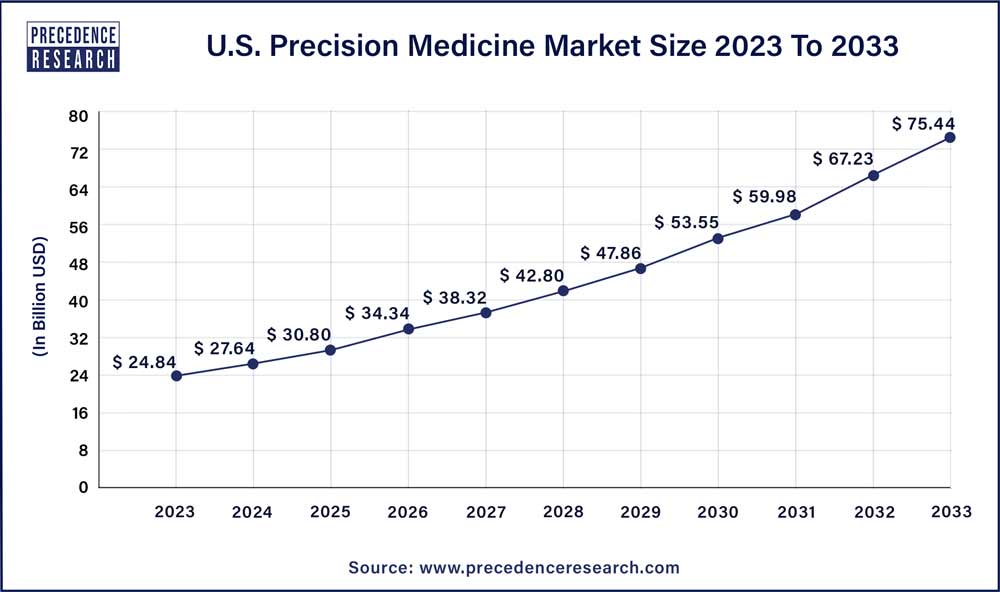Introduction:
The U.S. Precision Medicine market is experiencing a transformative phase, propelled by advancements in genomics, molecular biology, and data analytics. Precision medicine, also known as personalized medicine, involves tailoring medical treatment and healthcare decisions to the individual characteristics of each patient. This approach takes into account genetic, environmental, and lifestyle factors, allowing for more accurate diagnosis, targeted therapies, and improved patient outcomes. The U.S. Precision Medicine market is characterized by a dynamic landscape driven by technological innovation, research breakthroughs, and a shift towards more individualized and effective healthcare solutions.
Growth Factors:
Several factors contribute to the growth of the U.S. Precision Medicine market. Advances in genomic sequencing technologies have significantly lowered the cost of DNA sequencing, making it more accessible for both research and clinical purposes. The increasing understanding of genetic variations and their implications for disease susceptibility and treatment response has fueled the development of targeted therapies. Additionally, collaborative efforts between academia, healthcare institutions, and pharmaceutical companies have accelerated research in precision medicine, leading to the identification of new biomarkers and therapeutic targets. The growing adoption of electronic health records (EHRs) and the integration of big data analytics further support the implementation of precision medicine approaches, allowing for more efficient and data-driven decision-making in healthcare.
U.S. Precision Medicine Market Scope
| Report Coverage |
Details |
| Growth Rate from 2024 to 2033 |
CAGR of 11.80% |
| U.S. Market Size in 2023 |
USD 24.84 Billion |
| U.S. Market Size by 2033 |
USD 75.44 Billion |
| Base Year |
2024 |
| Forecast Period |
2024 to 2033 |
| Segments Covered |
By Technology, By Application, By End-Use, By Sequencing Technology, By Product, By Route of Administration, and By Drugs |
Recent Developments
- In March 2023, the global biotechnology company Seagen, which finds, develops, and markets revolutionary cancer medicines, was acquired by Pfizer for $229 in cash per Seagen share, amounting to a $43 billion enterprise value. Pfizer and Seagen Inc. announced that they have entered into a definitive merger agreement.
- In January 2024, the US state of California will see the establishment of a precision medicine center due to cooperation established by BIOS Health, the Kern Venture Group, and the city of Bakersfield. The facility will function as a central location for brain clinical trials and research and development (R&D) that makes use of the adaptive dosage technology from BIOS.
U.S. Precision Medicine Market Dynamics
Drivers:
Key drivers influencing the adoption of precision medicine in the U.S. include the rising prevalence of chronic diseases, such as cancer and cardiovascular disorders, where personalized treatment approaches have demonstrated significant efficacy. The shift towards value-based care and outcomes-based reimbursement models encourages healthcare providers to embrace precision medicine to enhance patient outcomes while controlling costs. Furthermore, patient demand for more personalized and effective treatments, coupled with increased awareness of genetic testing and its potential benefits, is driving the uptake of precision medicine in clinical practice. Government initiatives, such as the Precision Medicine Initiative (PMI), have also played a pivotal role by promoting research, infrastructure development, and data sharing to advance precision medicine in the country.
Restraints:
Despite its promising growth, the U.S. Precision Medicine market faces challenges. One significant restraint is the complexity and cost associated with implementing precision medicine approaches on a broader scale. The need for specialized infrastructure, expertise, and resources poses barriers to widespread adoption, particularly in smaller healthcare facilities. Ethical considerations, data privacy concerns, and the potential for genetic discrimination also present challenges to the integration of genomic information into routine clinical practice. Additionally, the variability in regulatory frameworks and reimbursement policies for precision medicine tests and therapies can create uncertainties for stakeholders, impacting the pace of adoption and investment in the sector.
Opportunity:
The U.S. Precision Medicine market presents substantial opportunities for innovation, collaboration, and improved patient outcomes. As technological advancements continue, there is potential for the development of more targeted and personalized therapies across a broader range of diseases. The integration of artificial intelligence and machine learning in analyzing large-scale genomic and clinical datasets offers the prospect of identifying novel biomarkers and treatment strategies. Collaborations between pharmaceutical companies, diagnostic laboratories, and healthcare providers are fostering the development of companion diagnostics and combination therapies, further enhancing the precision medicine landscape. Moreover, the emphasis on patient engagement and education creates opportunities for the expansion of genetic testing services and personalized healthcare solutions.
Region Snapshot
The U.S. Precision Medicine market is a focal point for advancements in personalized healthcare within North America. The country’s well-established healthcare infrastructure, research capabilities, and a robust ecosystem of biotechnology and pharmaceutical industries contribute to its leadership in precision medicine. Major academic medical centers and research institutions, such as the National Institutes of Health (NIH) and the Mayo Clinic, play a pivotal role in driving research and innovation in the field. The presence of a diverse population and a high disease burden provides a rich environment for studying genetic variations and developing targeted interventions. Additionally, strategic partnerships between industry stakeholders, research institutions, and government bodies contribute to the growth and sustainability of the U.S. Precision Medicine market.
Read Also: Solar Carport Market Size Will be USD 1,173.6 Million by 2033

